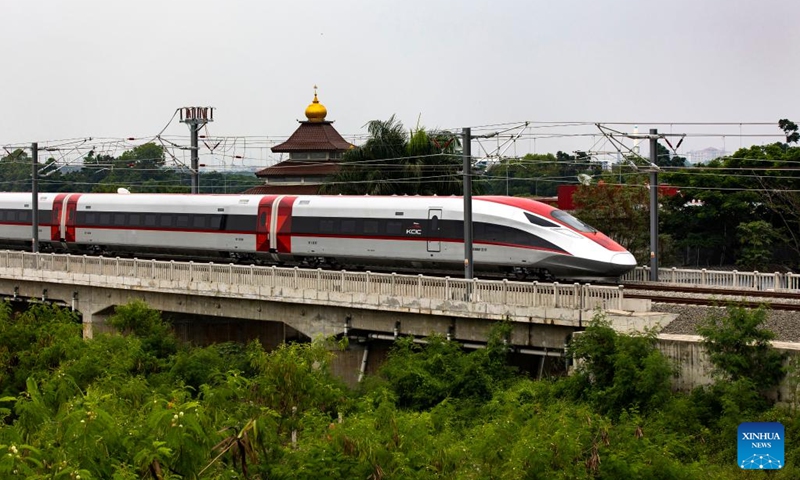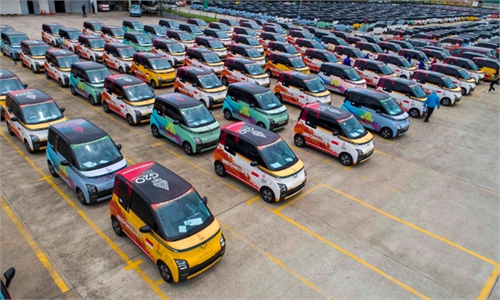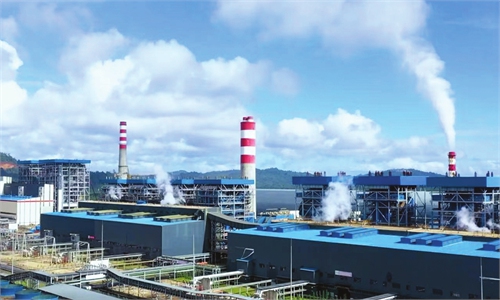China-Indonesia trade exchanges to get stronger as G20 lays foundation for closer ties
Shared future, RCEP to promote regional recovery

This photo taken on Nov. 9, 2022 shows electric multiple units being tested for hot-running on the Jakarta-Bandung High-Speed Railway trial section in Bandung, Indonesia. The hot-running test of the catenary system of the Jakarta-Bandung High-Speed Railway (HSR) trial section started on Wednesday, marked by the slow departure of the Chinese-made Electric Multiple Units from the Tegalluar Station in Bandung.(Photo: Xinhua)
Economic connections between China and Indonesia, host of the ongoing G20 Summit, are set to be strengthened, underpinned by a shared vision between the two countries and a new pattern of bilateral relations driven by the "four wheels" - political, economic, cultural and maritime cooperation.
Observers said that closer ties will bring much certainty to the economic development of Asia as a whole, which is in urgent need of a post-pandemic recovery as rising protectionism and geopolitical tensions have cast a shadow on the uncertain global economy.
China has played a positive role in promoting the rise of Indonesia, and through the meeting of the heads of state of China and Indonesia at the G20 Summit in Bali, the road to building a community with a shared future between the two countries will likely go broader, Xu Liping, director of the Center for Southeast Asian Studies at the Chinese Academy of Social Sciences, told the Global Times on Tuesday.
China is Indonesia's largest trading partner, with bilateral trade surpassing $100 billion in 2021, up by 58.6 percent year-on-year. China has been a major market for Indonesia's products such as palm oil, coal, steel, bird's nests, coffee and tropical fruits, and is now further buoyed by the RCEP deal.
According to a Reuters report in November, nine Indonesian companies signed contracts to sell 2.5 million tons of palm oil products valued at $2.6 billion to 13 Chinese buyers.
In the fields of nickel, the digital economy, infrastructure and new energy, China has contributed to Indonesia's economic development by introducing advanced technologies, providing financial support and cultivating local talent, the China Chamber of Commerce in Indonesia said in a report on October 29.
A vivid example of win-win bilateral ties is the construction of the Jakarta-Bandung High-speed Railway, as Indonesian President Joko Widodo said on October 13 that the construction achievements of the railway would be presented to the world during the G20 Bali Summit, further demonstrating the close partnership between the two governments.
With a design speed of 350 kilometers per hour, the railway built with Chinese technology will cut the journey between Jakarta and Bandung, the capital of Indonesia's West Java province, from over three hours to only 40 minutes.
Experts expect its economy to be on the fast track of recovery with the continuous advance of the East Asian economic integration process and implementation of the RCEP deal, noting that cooperation in areas including local currency settlement and e-commerce will bring more opportunities to all countries in the region.
Indonesia's Ministry of Trade has predicted that within five years of RCEP ratification, exports will grow by 8-11 percent, while foreign investment will increase by 22 percent.
"China is happy to see the rise of emerging economies like Indonesia, which gives positive energy for today's international order," Xu said.
Xu noted that since both China and Indonesia are major developing countries and important emerging market economies, they have similar development stages, extensive common interests, and broad prospects for further cooperation.
Tourism is also a huge part of China-Indonesia trade and economic cooperation, and Indonesia is hoping to expand cooperation with China in the recovery of its tourism sector, an Indonesian official said on Tuesday.
"Chinese tourists are very important for Indonesia. Before COVID-19, Chinese tourists stand as No 3 for visiting Indonesia, after Singapore and Malaysia," Rizki Handayani, deputy of tourism products and events of Indonesia's Ministry of Tourism and the Creative Economy, told the Global Times on the sidelines of the G20 Summit on Tuesday.
Handayani said that Indonesia is looking forward to continuing collaboration with China and attracting more Chinese visitors, adding that the G20 will help Indonesia promote tourism.
"China hopes to work with Indonesia to deepen high-level strategic mutual trust, strengthen high-quality cooperation on the Belt and Road Initiative and practical cooperation in other fields, and advance our comprehensive strategic partnership for more outcomes, to bring more benefits to the two countries and peoples and contribute more positive energy to regional and world peace and development," Zhao Lijian, spokesperson of the Chinese Foreign Ministry, told a regular press conference on November 11.
Experts are also calling for joint efforts by China, Indonesia and other ASEAN members to drive regional development to a new high as divisions are widening in some other parts of the world.
Xu Ningning, executive president of the China-ASEAN Business Council, said that RCEP members should strengthen connectivity and make action plans for the regional digital economy, green development and cooperation among smaller firms to jointly deal with external challenges such as international financial instability and disrupted industrial supply chains.
"The cooperation prospects between China and ASEAN are promising, facilitated by the high-quality joint building of the Belt and Road Initiative," he told the Global Times, noting that ASEAN has great demand for China's products including raw materials and daily necessities.
Ma Jingjing contributed to this story




